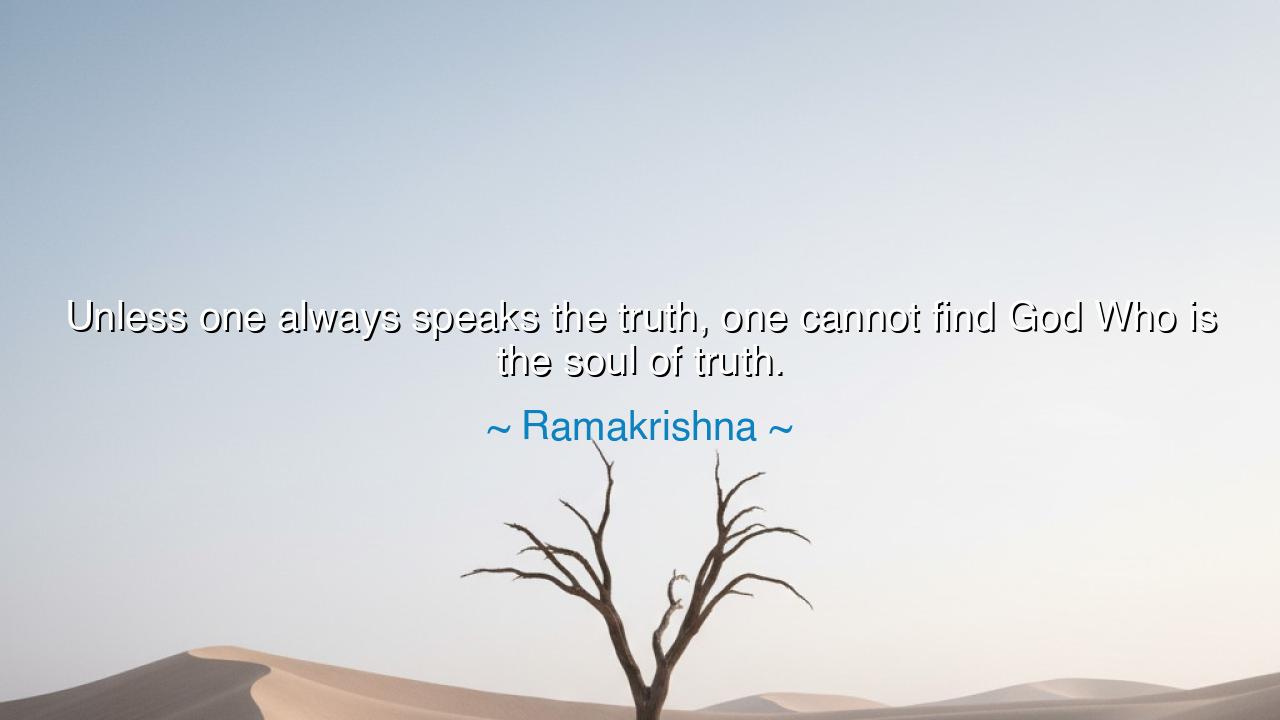
Unless one always speaks the truth, one cannot find God Who is






The words of Sri Ramakrishna—“Unless one always speaks the truth, one cannot find God Who is the soul of truth”—flow with the power of a river that springs from the eternal source. In them is contained the essence of his teaching: that truth is not merely a moral choice but a divine necessity. To lie, to distort, to conceal is to cover the light of the soul with shadows. To speak truth is to walk in harmony with the very being of God, for God is the soul of truth, unchanging, radiant, eternal. Thus, one who clings to falsehood bars his own heart from the vision of the Divine.
The ancients have long proclaimed this. In the Vedas, it is written: Satyam eva jayate—“Truth alone triumphs.” The Upanishads declare truth as the highest dharma, the pillar upon which the universe itself rests. Ramakrishna, who lived not as a philosopher alone but as one intoxicated with God, gave this teaching not as theory but as direct experience. He saw that the Divine cannot be found by lips that deceive, for deceit is born of fear and desire, while God is pure and fearless. Only the soul that embraces truth in every word and act is fit to behold the One who is Truth itself.
History bears witness to this law. Consider the life of Mahatma Gandhi, who made truth—or Satyagraha, the force of truth—the foundation of his struggle against oppression. He declared that truth was God, and God was truth. Gandhi refused to lie even when lies might have spared him suffering or hastened his cause. For him, truth was not only a strategy but the very path to God. His steadfastness revealed Ramakrishna’s wisdom: that to cling to truth always, without compromise, is to draw near to the Divine, and through that Divine strength, to transform the world.
In contrast, falsehood leads only to ruin. The liar may gain for a season, but the soul is weakened, and the vision of God recedes. Think of leaders who built their power on lies, promising greatness but sowing only destruction. They gained thrones and treasures, but their names became curses upon the earth. Their words severed them from truth, and thus from God, and in the end, they reaped only dust. The soul cannot commune with the Eternal when it is chained by deceit.
But Ramakrishna’s words are not only for sages and saints—they are for all who seek meaning in life. In daily speech, in small dealings, in family and work, truth must be honored. A lie told in jest, a falsehood spoken for convenience, a distortion whispered for gain—all of these may seem small, but they accumulate like clouds, hiding the soul from the light of God. To make truth the law of one’s tongue is to clear the path for divine vision, to keep the soul transparent before the Eternal.
The lesson, then, is clear: practice truthfulness as a sacred discipline. Do not excuse yourself with “small lies,” for every falsehood estranges you from the Divine. Speak truth always, even when it costs you, even when it brings rejection, for in that courage lies purification. Let your life become a mirror of reality, unclouded by deceit. Then, like a clear lake reflecting the sun, your soul will reflect God, the soul of truth.
Therefore, O seeker, remember Ramakrishna’s wisdom: God cannot be found by lips that lie, nor by hearts that deceive. If you desire to know the Eternal, discipline yourself in truth. Let your words be pure, let your heart be clear, let your deeds be honest. In this way, every syllable you speak becomes a hymn to God, every action a prayer, and every breath a step closer to the Divine. For when you always speak the truth, you will find that Truth itself—God—has already been dwelling within you.






HTvu thi hong tham
I love how this quote links truth to the divine, but it also raises some complex questions. How often do we speak the truth, and what does it really mean to do so? Is truth always black and white, or can it be more subjective? And if truth is truly the soul of God, can we experience the divine even if we fall short of perfect honesty at times?
YHHai Yen Hong
Ramakrishna’s quote touches on a fundamental aspect of spirituality: the purity of truth. If truth is the essence of God, does that mean every lie, no matter how small, distances us from divinity? I’m curious—do you believe that spiritual enlightenment requires a constant commitment to truth, or is it more about the intention behind our words and actions? Can we still be spiritual even if we fail to speak the truth at all times?
NMVo Van Nhat Minh
I find this quote fascinating because it presents truth as the key to spiritual awakening. It raises the question—how can we reconcile the times when telling the truth might hurt others or create discomfort? Does it mean we should always speak the harsh truth, or is there room for tact and compassion while still seeking the divine? It’s an interesting dilemma that I’m curious to explore.
VBTran Van Bac
This quote really makes me think about the connection between truth and spirituality. It suggests that speaking the truth is not just about honesty in our words but a deeper alignment with the divine. Do you think it’s possible to truly find God, or connect with higher truths, without consistently speaking the truth? Or is there a part of the spiritual journey that requires us to be absolutely truthful at all times?